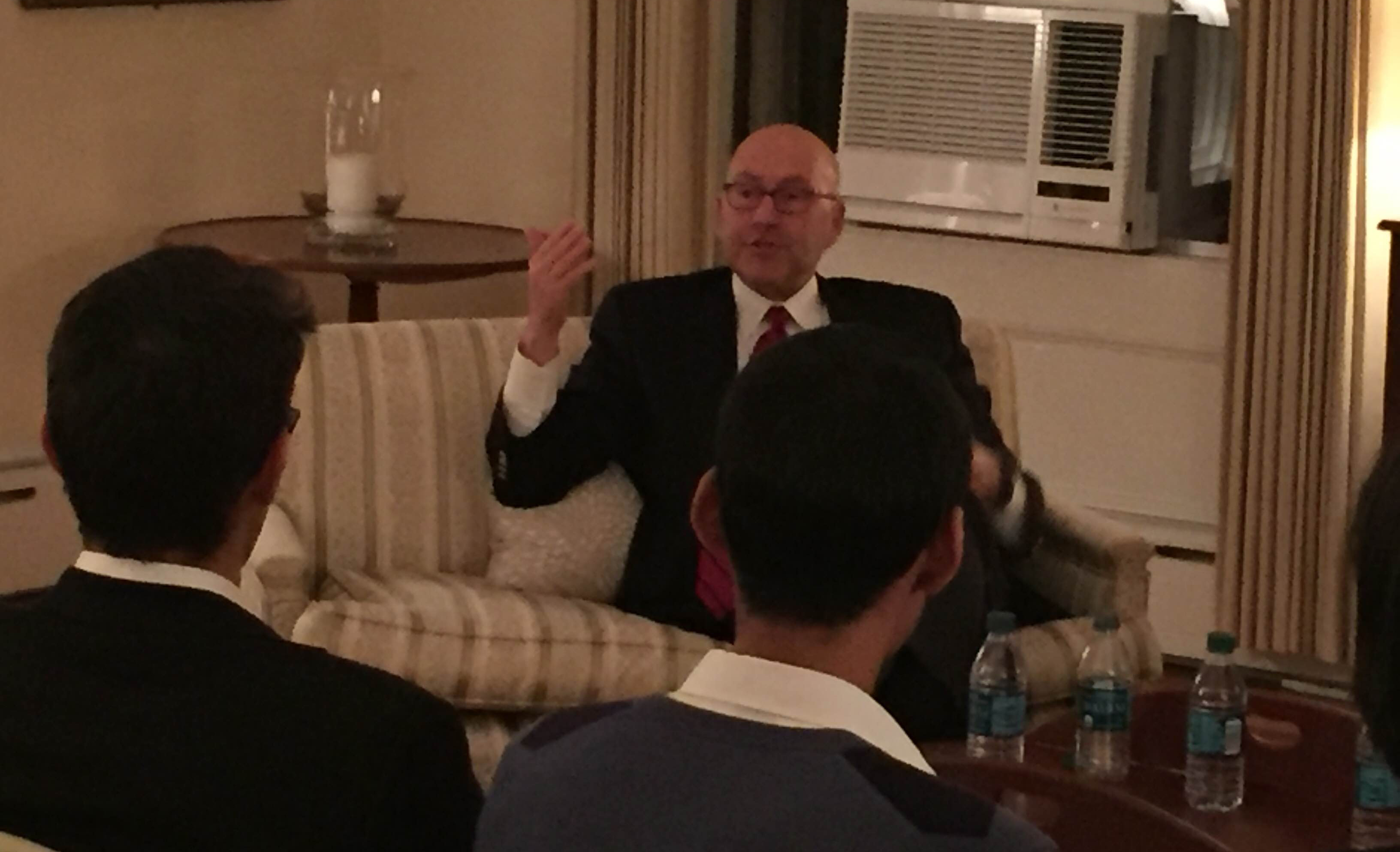
At a joint talk between Canadian Ambassador to the U.S. Gary Doer and former U.S. Ambassador to Canada David Jacobson Monday evening, diplomats discussed both the general role of an ambassador and the “special” relationship between their two countries.
The talk, titled “Diplomacy in the Age of Globalization,” took place at the Provost’s House, where 30 members of the Yale and New Haven communities gathered to hear the most recent installment of Yale’s continuing lecture series on Canada.The talk, hosted by Richard Albert, a Canadian visiting professor at Yale Law School allowed Doer and Jacobson to provide perspective on how current events impact the U.S-Canada relationship, which Albert called “the most important in the world, to Canada.”
“[Canada has] only one neighbor, and it happens to be the richest, biggest, strongest country in, probably, the history of the world,” Jacobson said. “There’s one thing I always tried to do, and that was to respect the Canadian people; it didn’t mean that I had to agree with them, it meant that I had to respect them and their point of view.”
The ambassadors addressed possible strains in the U.S-Canada relationship given recent issues including the Keystone Pipeline, an oil pipeline proposed to run between the two countries, and October’s turnover in the Canadian administration with the election of Prime Minister Justin Trudeau.
The Keystone Pipeline has garnered significant environmental and economic criticism since it was commissioned in 2010. President Barack Obama rejected an application to build the pipeline at the beginning of this month.
Jacobson said the pipeline did not significantly damage relations between Canada and the U.S., though it did dominate the media and public interest. Doer agreed with Jacobson, expressing frustration that this concern overwhelmed talks of significant progress made on the governments’ “checklists.” Elaborating, he stated that 90 percent of the meetings held between the two countries concern national security, a point of continuously successful negotiation. Still, while the Keystone Pipeline is a relatively small part of diplomatic dialogues, Doer said, it remains the focus of public conversation.
Speaking to the possible impact of the 2016 presidential election on U.S. relations with Canada, Jacobson says he anticipates no major shifts. Though more extreme foreign policy toward Canada may be floated by presidential candidates in the primary, he said, it is ultimately within the U.S.’s best interests to preserve a good relationship with the nation.
“People win nominations on the extreme and win the presidency in the middle,” Doer said.
As for the recent changes in Canada’s administration — changes which prompted Trudeau to declare that “Canada is back” on the international stage — both Doer and Jacobson are cautiously optimistic.
Both ambassadors cited the environment as a key area in which Canada’s efforts to reduce carbon emissions and fund innovation are making progress.
“The U.S. will judge not by what we say but by what we do,” Doer said.
Shifting the conversation from the U.S.-Canada relationship to the role of ambassadors more generally, Jacobson spoke of their two main functions. The first is representing, in this case, the United States to Canada, which includes acting as a public face and negotiating on issues that are essential to Americans. The second is to actively work toward an understanding of the Canadian people and bring their concerns to lawmakers in Washington. The latter is more difficult, Jacobson said.
On the Canadian side, the relationship often requires a sense of humor, Doer said. While Canada may not be always mentioned in presidential debates about foreign policy, he said, this is actually a good thing — candidates do not discuss those nations with which the U.S. already gets along. As for how Americans view Canadians, Jacobson praised Obama’s humility in interactions with Canada.
“I would always think to myself—if [Obama] was here, if he knew what I knew, what would he do?” Jacobson said.
Albert said he hoped the talk would bring more of Canada to Yale by providing insight to Canadians living abroad, as well as to Americans curious about the U.S.’s relationship with its neighbor, on how the two countries interact. Audience questioning allowed participants to further explore this relationship.
Arash Ghiassi LAW ’18, a Canadian student at the Law School, expressed particular interest in the dynamic between the two diplomats, as one is a former ambassador and the other is currently serving.
“I enjoyed witnessing their familiarity with each other,” said Sameer Jaywant LAW ’18, a dual Canadian and American citizen. “They had an ease with one another I could tell was beneficial during their working relationship. That spoke a lot to the nature of diplomacy — how genuine your relationships have to be.”
The series will resume next semester and host events through the remainder of the academic calendar.
Clarification, Dec. 2: A previous version of this article stated that visiting professor Richard Albert called the U.S.-Canada relationship “the most important in the world.” His full statement clarified that this relationship is the most important in the world, to Canada.







